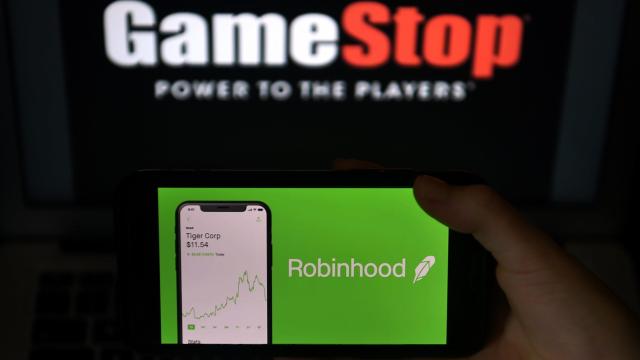The self-proclaimed democratic financial app Robinhood came under fire on Thursday for temporarily halting trading on GameStop stocks and other stocks favoured by Reddit’s WallStreetBets community. But while critics accused the stockbroker of foiling amateur investors to shield major Wall Street firms from mounting losses, Robinhood claims the real explanation is much more boring: It simply couldn’t afford to keep up with the flurry of meme stock trading.
You see, when buying or selling stocks, the exchange goes through an intermediary clearinghouse that makes sure everything’s in order to mutualise risk. Clearinghouses, which are registered and approved by the Securities and Exchange Commission, record the trade as well as collect and deal out payments once the buyer and seller agree on a price. They also enforce deposit requirements, a form of risk management to protect themselves in the process, which means brokers must post a certain amount of collateral to ensure their trades go through. Apparently, Robinhood’s clearinghouse jacked up these deposit requirements this week, likely because it was spooked by the volatility of skyrocketing stock prices for GameStop, AMC, BlackBerry, and other battered companies that Reddit users set their sights on in an effort to screw over the hedge funds that bet heavily against them.
“To put it in perspective, this week alone, our clearinghouse-mandated deposit requirements related to equities increased ten-fold,” Robinhood said in a blog post published late Friday. “And that’s what led us to put temporary buying restrictions in place on a small number of securities that the clearinghouses had raised their deposit requirements on.”
The broker also emphasised that it didn’t shut off trading to hurt retail investors. Speculation that Robinhood yanked trading on certain stocks on behalf of hedge fund managers, the U.S. government, or other fat cats to preserve their financial interests has run rampant online since the company’s decision.
“It was not because we wanted to stop people from buying these stocks,” Robinhood continued. “We did this because the required amount we had to deposit with the clearinghouse was so large — with individual volatile securities accounting for hundreds of millions of dollars in deposit requirements — that we had to take steps to limit buying in those volatile securities to ensure we could comfortably meet our requirements.”
It’s unclear why Robinhood didn’t come out with this explanation right away, instead allowing time for conspiracy theories to fester online about corruption and nefarious plots to crack down on the amateur investors making bank in all this. Granted, speculation likely still would have cropped up no matter what — this is the internet we’re talking about, after all — but to opt for radio silence only adds fuel to the fire.
To wit, Google removed at least 100,000 negative reviews of Robinhood from the Google Play store after pissed off users sent tons of critical reviews and sank the app’s rating. Robinhood’s restrictions also prompted two class-action-lawsuits, one for alleged violations of its customer agreement and another for alleged violations of antitrust law, brought by the same lawyer who is currently handing Alex Jones his arse in court. Congress has even been pulled into the GameStonks drama and is reportedly planning an investigation. The U.S. Securities and Exchange Commission is monitoring the situation as well.
This bizarre saga appears far from over, so strap in folks. And invest wisely.
